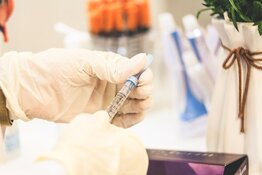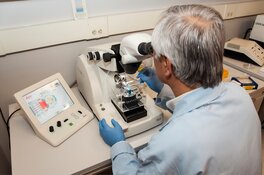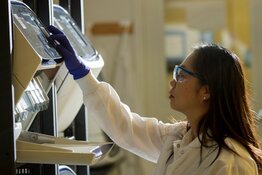Leading regenerative medicine company Sernova Biotherapeutics Inc. (SVA:TSX.V; SEOVF:OTCQB; PSH:XETRA) announced the submission of Investigational New Drug (IND) application with the U.S. Food and Drug Administration (FDA) for its Cell Pouch auto-transplanted with thyroid cells in patients undergoing total thyroidectomy for nodular thyroid disease.
The news comes as the company also announced a new Chair of the Board with deep industry knowledge and experience and a name change to better reflect its business.
Millions of people worldwide are affected by hypothyroidism, which is characterized by insufficient production of the hormone, often requiring lifelong hormone replacement therapy.
"This IND submission represents a step forward in our commitment to transforming endocrine disorder treatment, Chief Executive Officer Jonathan Rigby said. "Our Cell Pouch has shown the ability to establish a vascularized, organ-like environment for transplanted cells, and we believe this innovative approach could restore thyroid function and enhance the quality of life for patients facing lifelong hypothyroidism."
Sernova said preclinical trial data showed that re-implantation of thyroid tissue into the pre-vascularized Cell Pouch, without immune suppression, resulted in the restoration of hormones without any hormone supplementation.
"In addition, radio-isotope uptake imaging and histology assessments confirmed the presence of health and functional thyroid tissues within the Cell Pouch five months following re-implantation," the company said in a release.
With FDA clearance, the company plans to explore the initiation of human trials for the treatment.
"Once active, this trial will be the second formal trial for which the Cell Pouch is/will be undergoing formal human test," wrote Douglas Loe, an analyst with Leede Financial Inc. in an updated research note on February 3. "We are encouraged by Sernova's decision to expand its clinical horizons into thyroid disease, consistent without our model expectations."
Process Forms a Vascularized Organ-Like Environment
Sernova's Cell Pouch is a vascularized cell-carrying bio-hybrid organ implanted in the human body. In an ongoing U.S. Phase 1/2 clinical trial, Sernova is assessing the treatment of patients with insulin-dependent type 1 diabetes and severe hypoglycemic episodes with donor islets implanted within the subcutaneous Cell Pouch. To protect cells from immune attack, Sernova is working toward an optimized immunosuppression protocol.
To deliver treatment, the Cell Pouch is pre-implanted under the skin between the deep subcutaneous muscle and the fascia, an area rich in blood vessels. The bio-hybrid organ is uniquely designed with pores into which vascularized tissue grows over several weeks post-implantation, forming a vascularized organ-like environment believed to be critical for the long-term survival and function of therapeutic cells. Following the development of the organ-like environment, the cells are transplanted into its containment channels and engrafted into the surrounding micro-vessel-rich environment, where they read blood sugar levels and release insulin and other hormones to naturally control blood glucose levels.
Clinical trial data so far have shown the Cell Pouch to be safe and well tolerated and the treatment to be effective, reported Dr. Joseph Pantginis, H.C. Wainwright & Co. analyst, in a research report.
"The Cell Pouch is the most advanced encapsulation device in development," Ventum Capital Markets Analyst Stefan Quenneville wrote in a September research report.
"We are encouraged by Sernova's decision to expand its clinical horizons into thyroid disease, consistent without our model expectations," wrote Douglas Loe, an analyst with Leede Financial Inc.
In collaboration with Evotec AG (EVTCY:OTCPK), Sernova is also developing an implantable off-the-shelf, induced pluripotent stem cell (iPSC)-based islet replacement therapy, Technical Analyst Clive Maund wrote recently.
"This partnership provides Sernova a potentially unlimited supply of insulin-producing cells to treat millions of patients with insulin-dependent diabetes (Type 1 and Type 2)," Maund wrote. "If Sernova is successful in bringing its functional cure for insulin-dependent diabetes to the stage where it can go into commercial production, the global market for it will be massive."
Loe with Leede Financial expressed optimism that Sernova could "receive feedback on its IND and the study design described therein by the end of the current calendar quarter. If so achieved, pending capital availability, we believe that Sernova could commence Phase I/II thyroid disease testing by FQ325."
The analyst continued, "We are maintaining our Speculative Buy rating and one-year PT (price target) of CA$1.50 on SVA, with our valuation still based on NPV (35% discount rate) and multiples of our F2030 EBITDA/EPS forecasts. Our assessment of Sernova’s foundational value, and thus of Cell Pouch’s foundational value, is, however, more fundamentally based on our view that a well-vascularized subcutaneously-implanted, cell function-preserving minimally fibrosed cell reservoir like Cell Pouch is now and can continue to be relevant to sustaining disease-curing activity of any cell type deployed within it."
Nations Spend as Much as 9% of Health Budget on Diabetes
Diabetes affects 537 million globally and is expected to affect 643 million people by 2030, the International Diabetes Foundation reported. Nations spend as much as 9% of their health budget on the disease, and about 10% of diabetes patients are insulin-dependent.
Grand View Research reported that the global market size for diabetes devices was estimated at about US$30.31 billion in 2023 and is projected to grow at a CAGR of 7.45% from 2024 to 2030.
The global live cell encapsulation market encompasses drug delivery, regenerative medicine, and cell transplantation. It is expected to continue growing through at least 2030, according to Grand View. The market's value, US$210.7 million in 2022, is forecast to increase at a 3.97% compound annual growth rate between that year and 2030.
Along with diabetes and hypothyroidism, live cell encapsulation is being used to treat neurological disorders like Parkinson's disease, the market research firm noted. Further, it has been proven to be a suitable way to deliver treatment for other types of diseases, including cancer, anemia, heart failure and more.
Grand View noted that market growth is expected to be driven by the increasing use of live cell encapsulation in regenerative medicine to replace disease or damaged tissues. A related contributor is rising public and private funding and investments in cell and gene therapies.
New Experienced Board Chair
The new Chair of the Board, Ross Haghighat "brings a wealth of financing and deal experience to Sernova's Board and leadership team," the company said in a release.
Haghighat has more than three decades of experience founding, funding, and scaling technology ventures in health care, Sernova said, adding that he is "known for his long-term strategic insights and the execution thereof, as evidenced in successfully driving multiple companies to achieve significant milestones and growth."
"We are thrilled to welcome Ross Haghighat as our new Chair of the Board," Rigby said. "His deep industry knowledge and visionary leaders make him the perfect fit to guide Sernova as we advance our pipeline of transformative therapies. His appointment underscores our commitment to fulfilling our mission of bringing solutions to patients in need."
Haghighat said he was "honored to join Sernova and support its journey toward approval of its Cell Pouch bio-hybrid organ as a functional cure for TID."
"The company's pioneering work in cell therapy is truly inspiring," Haghighat continued. "I look forward to working with Jonathan, the Board, and the entire team to advance Sernova's mission and deliver on our goals."
According to the company, its Board of Directors expressed unanimous support for the appointment of Haghighat.
New Name Reflects Business Better
In the release, Sernova also said it would change its name from Sernova Corp. to Sernova Biotherapeutics Inc. to "better communicate the nature of the business." No ticker symbol changes are expected.
 Streetwise Ownership Overview*
Streetwise Ownership Overview*
Sernova Biotherapeutics Inc. (SVA:TSX.V; SEOVF:OTCQB; PSH:XETRA)
Sernova also said the company will complete the continuance of its corporate jurisdiction into British Columbia and become a corporation existing under the Business Corporations Act of British Columbia instead of the Canada Business Corporations Act. This change was approved by shareholders with a special resolution at the company's annual and special general meeting on January 10.
Ownership and Share Structure
According to Refinitiv, about 4.1% of the company is held by insiders and management and approximately 0.05% by institutions. The rest is retail.
Top shareholders include Director Steven Sangha with 3.97%, Chief Financial Officer James Parsons with 0.12%, CATAM Asset Management AG with 0.05%, and Chief Business Officer Modestus Obochi with 0.02%.
Sernova has 328.48 million outstanding shares and 315.01 million free-float traded shares.
Its market cap is CA$72.45 million. It trades in a 52-week range between CA$0.70 and CA$0.17.
| Want to be the first to know about interesting Biotechnology / Pharmaceuticals and Medical Devices investment ideas? Sign up to receive the FREE Streetwise Reports' newsletter. | Subscribe |
Important Disclosures:
- Sernova Biotherapeutics Inc. has a consulting relationship with Street Smart an affiliate of Streetwise Reports. Street Smart Clients pay a monthly consulting fee between US$8,000 and US$20,000.
- As of the date of this article, officers and/or employees of Streetwise Reports LLC (including members of their household) own securities of Sernova Biotherapeutics Inc.
- Steve Sobek wrote this article for Streetwise Reports LLC and provides services to Streetwise Reports as an employee.
- This article does not constitute investment advice and is not a solicitation for any investment. Streetwise Reports does not render general or specific investment advice and the information on Streetwise Reports should not be considered a recommendation to buy or sell any security. Each reader is encouraged to consult with his or her personal financial adviser and perform their own comprehensive investment research. By opening this page, each reader accepts and agrees to Streetwise Reports' terms of use and full legal disclaimer. Streetwise Reports does not endorse or recommend the business, products, services or securities of any company.
- This article does not constitute medical advice. Officers, employees and contributors to Streetwise Reports are not licensed medical professionals. Readers should always contact their healthcare professionals for medical advice.
For additional disclosures, please click here.










































